-
 Bitcoin
Bitcoin $83,309.8774
-1.88% -
 Ethereum
Ethereum $1,591.3660
-2.42% -
 Tether USDt
Tether USDt $0.9998
-0.01% -
 XRP
XRP $2.0864
-2.28% -
 BNB
BNB $580.9809
-0.68% -
 Solana
Solana $125.6682
-3.01% -
 USDC
USDC $0.9999
0.00% -
 TRON
TRON $0.2516
0.03% -
 Dogecoin
Dogecoin $0.1542
-3.08% -
 Cardano
Cardano $0.6142
-3.69% -
 UNUS SED LEO
UNUS SED LEO $9.3431
-0.92% -
 Chainlink
Chainlink $12.3641
-2.37% -
 Avalanche
Avalanche $18.8865
-5.31% -
 Stellar
Stellar $0.2358
-2.40% -
 Toncoin
Toncoin $2.8805
-0.91% -
 Shiba Inu
Shiba Inu $0.0...01169
-1.89% -
 Sui
Sui $2.1008
-4.00% -
 Hedera
Hedera $0.1574
-5.48% -
 Bitcoin Cash
Bitcoin Cash $318.9019
-1.04% -
 Litecoin
Litecoin $75.9077
-2.52% -
 Polkadot
Polkadot $3.5432
-3.69% -
 Dai
Dai $1.0000
0.00% -
 Bitget Token
Bitget Token $4.2538
-1.47% -
 Hyperliquid
Hyperliquid $15.1227
-5.40% -
 Ethena USDe
Ethena USDe $0.9991
0.00% -
 Pi
Pi $0.6199
-16.77% -
 Monero
Monero $217.3319
2.19% -
 Uniswap
Uniswap $5.2227
-2.58% -
 OKB
OKB $52.2436
1.28% -
 Pepe
Pepe $0.0...07082
-3.62%
How to pay tax on mining income from cloud computing power mining platforms?
Cloud mining income is taxable; report its value at receipt, and consider deductions for related expenses to reduce your tax liability.
Apr 06, 2025 at 07:14 am
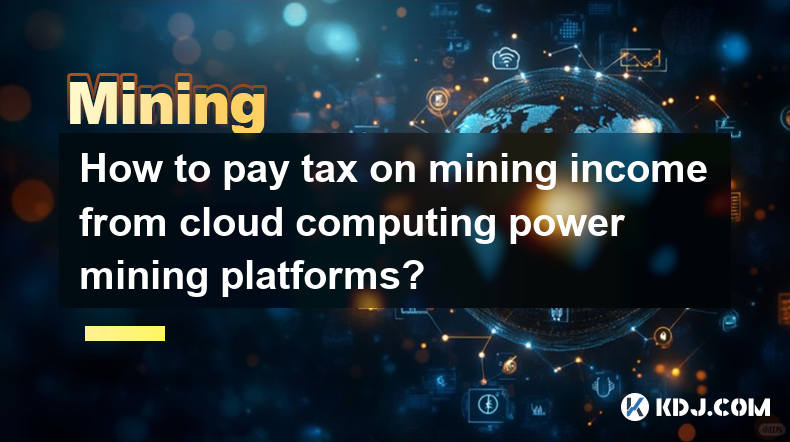
Navigating the tax implications of income generated from cloud computing power mining platforms can be complex. As cryptocurrencies gain mainstream acceptance, understanding how to report and pay taxes on mining income is crucial for compliance and financial planning. This article will guide you through the process, addressing potential questions and providing detailed steps to ensure you meet your tax obligations effectively.
Understanding Mining Income from Cloud Computing Power Platforms
Cloud computing power mining platforms allow individuals to rent computing power to mine cryptocurrencies without the need for personal hardware. The income generated from these platforms is considered taxable income by many tax authorities worldwide. This income can come in the form of the cryptocurrency mined or, in some cases, a share of the profits in fiat currency.
Determining Your Taxable Income
To accurately report your mining income, you first need to determine the value of the cryptocurrency you've earned. The value is typically based on the market price of the cryptocurrency at the time you receive it. Keep detailed records of the dates and amounts of cryptocurrency received, as well as the corresponding market values.
- Use reputable cryptocurrency price trackers to determine the market value.
- Record the date and time of each mining reward to ensure accurate valuation.
- Keep receipts or transaction records from the cloud mining platform.
Classifying Your Mining Income
The Internal Revenue Service (IRS) in the United States, for example, treats cryptocurrency as property. Therefore, mining income is considered taxable income and must be reported on your tax return. Other countries may have similar classifications, but it's essential to check local tax laws.
- In the U.S., report mining income on Schedule 1 (Form 1040) and Schedule D if you sell the cryptocurrency.
- In the UK, mining income is treated as miscellaneous income and reported on the Self Assessment tax return.
- In Australia, mining income is considered ordinary income and reported on the individual tax return.
Calculating Your Tax Liability
Once you've determined the value of your mining income, you need to calculate your tax liability. This involves applying the appropriate tax rates to your income. The tax rates can vary based on your total income and the tax laws of your country.
- In the U.S., mining income is taxed as ordinary income at your marginal tax rate.
- In the UK, mining income is subject to income tax at rates ranging from 20% to 45%.
- In Australia, mining income is taxed at your marginal tax rate, which can range from 0% to 45%.
Reporting Your Mining Income
Reporting your mining income accurately is crucial to avoid penalties and audits. You'll need to include the value of the cryptocurrency mined on your tax return and any subsequent sales of that cryptocurrency.
- In the U.S., report the fair market value of the cryptocurrency mined on the date of receipt.
- In the UK, report the total value of the cryptocurrency mined during the tax year.
- In Australia, report the total value of the cryptocurrency mined as part of your assessable income.
Keeping Records for Tax Purposes
Maintaining detailed records is essential for accurately reporting your mining income and for potential audits. Keep records of all transactions, including the date, amount, and value of the cryptocurrency mined, as well as any fees or expenses related to mining.
- Keep a ledger or use cryptocurrency tax software to track your mining income.
- Retain receipts and transaction records from the cloud mining platform.
- Document any expenses related to mining, such as electricity costs or platform fees.
Deducting Mining Expenses
You may be able to deduct certain expenses related to your mining activities, which can help reduce your taxable income. These expenses can include electricity costs, platform fees, and other direct costs associated with mining.
- In the U.S., mining expenses can be deducted as business expenses on Schedule C.
- In the UK, mining expenses can be claimed as allowable expenses on the Self Assessment tax return.
- In Australia, mining expenses can be claimed as deductions on the individual tax return.
Dealing with Cryptocurrency Sales
If you sell the cryptocurrency you've mined, you'll need to report any gains or losses on your tax return. The tax treatment of these sales can vary depending on the holding period and the tax laws of your country.
- In the U.S., report cryptocurrency sales on Schedule D and Form 8949.
- In the UK, report cryptocurrency sales on the Capital Gains Tax section of the Self Assessment tax return.
- In Australia, report cryptocurrency sales on the Capital Gains Tax section of the individual tax return.
Seeking Professional Tax Advice
Given the complexity of cryptocurrency taxation, it's often beneficial to seek professional tax advice. A tax professional can help you navigate the specific tax laws of your country and ensure you're meeting all your tax obligations.
- Consult with a tax advisor who specializes in cryptocurrency taxation.
- Keep them informed of all your mining activities and transactions.
- Ask about any potential tax planning strategies to minimize your tax liability.
Common Questions Related to Paying Tax on Mining Income from Cloud Computing Power Mining Platforms
Q: How do I determine the value of the cryptocurrency I've mined?
A: The value of the cryptocurrency you've mined is typically based on the market price at the time you receive it. Use reputable cryptocurrency price trackers to determine the market value and keep detailed records of the dates and amounts of cryptocurrency received.
Q: Do I need to report mining income if I haven't sold the cryptocurrency?
A: Yes, you need to report the fair market value of the cryptocurrency mined on the date of receipt, even if you haven't sold it. This is considered taxable income in many jurisdictions.
Q: Can I deduct expenses related to cloud mining?
A: Yes, you may be able to deduct certain expenses related to your mining activities, such as electricity costs, platform fees, and other direct costs. These deductions can help reduce your taxable income.
Q: What happens if I sell the cryptocurrency I've mined?
A: If you sell the cryptocurrency you've mined, you'll need to report any gains or losses on your tax return. The tax treatment of these sales can vary depending on the holding period and the tax laws of your country.
Q: Should I seek professional tax advice for my mining income?
A: Given the complexity of cryptocurrency taxation, it's often beneficial to seek professional tax advice. A tax professional can help you navigate the specific tax laws of your country and ensure you're meeting all your tax obligations.
Disclaimer:info@kdj.com
The information provided is not trading advice. kdj.com does not assume any responsibility for any investments made based on the information provided in this article. Cryptocurrencies are highly volatile and it is highly recommended that you invest with caution after thorough research!
If you believe that the content used on this website infringes your copyright, please contact us immediately (info@kdj.com) and we will delete it promptly.
- Movement Labs and the Movement Network Foundation have launched an independent investigation into recent market-making irregularities related to the MOVE token.
- 2025-04-16 09:15:12
- Shiba Inu (SHIB) burn rate saw an over 2000% hike, leading to the removal of 20.83 million tokens from circulation.
- 2025-04-16 09:15:12
- Securitize Acquires MG Stover's Fund Administration Business to Become the Largest Digital Asset Fund Administrator
- 2025-04-16 09:10:12
- Trump administration plans to present Congress with cuts to most funding for public media
- 2025-04-16 09:10:12
- XRP (XRP) Displays Promising Growth Potential as It Currently Trades Above $2.00 and the 21-week EMA
- 2025-04-16 09:05:13
- BYDFi Lists $KERNEL, the Governance Token of KernelDAO, with Spot Trading Now Live
- 2025-04-16 09:05:13
Related knowledge
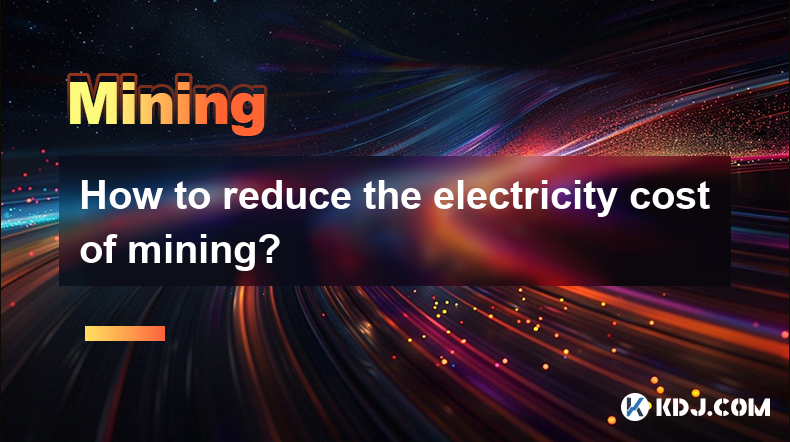
How to reduce the electricity cost of mining?
Apr 16,2025 at 08:42am
Mining cryptocurrencies, particularly Bitcoin, is an energy-intensive process that can lead to significant electricity costs. However, there are several strategies that miners can employ to reduce these expenses and make their operations more cost-effective. In this article, we will explore various methods to minimize the electricity cost of mining. Cho...
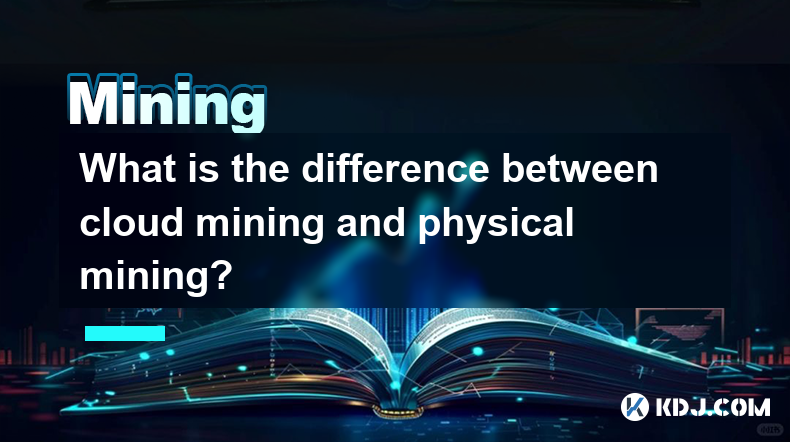
What is the difference between cloud mining and physical mining?
Apr 16,2025 at 01:49am
What is the difference between cloud mining and physical mining? In the world of cryptocurrencies, mining is the process by which new coins are generated and transactions are verified and added to the blockchain. There are two primary methods of mining: cloud mining and physical mining. Understanding the differences between these two approaches can help...
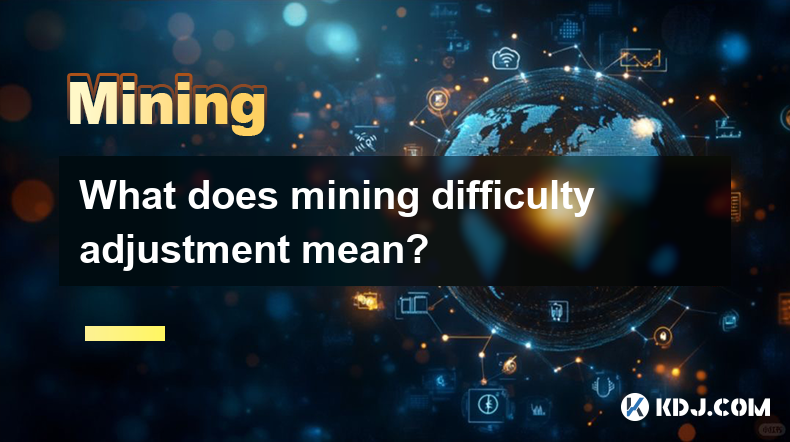
What does mining difficulty adjustment mean?
Apr 16,2025 at 12:42am
What does mining difficulty adjustment mean? Mining difficulty adjustment is a crucial mechanism in blockchain networks, particularly in Proof of Work (PoW) systems like Bitcoin. It ensures that the rate at which new blocks are added to the blockchain remains consistent, despite fluctuations in the total computational power (hash rate) of the network. T...
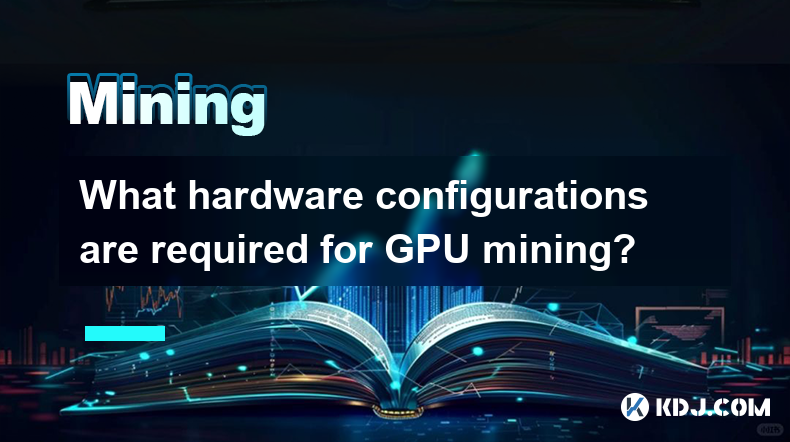
What hardware configurations are required for GPU mining?
Apr 16,2025 at 09:21am
GPU mining has become a popular method for cryptocurrency enthusiasts to mine various cryptocurrencies, such as Ethereum, Ravencoin, and others. To successfully engage in GPU mining, it is essential to understand the hardware configurations required to maximize efficiency and profitability. This article will delve into the specifics of what you need to ...
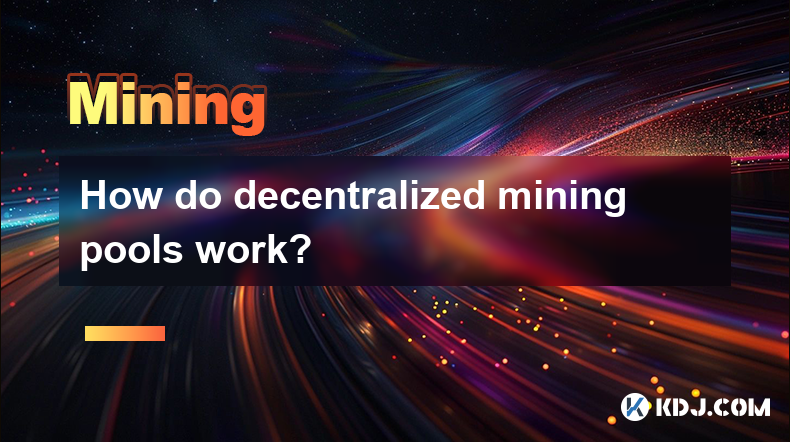
How do decentralized mining pools work?
Apr 16,2025 at 05:42am
Decentralized mining pools represent a significant evolution in the world of cryptocurrency mining, offering a more democratic and transparent approach compared to traditional centralized pools. In this article, we will explore the mechanics of decentralized mining pools, their benefits, and how they operate within the cryptocurrency ecosystem. What are...
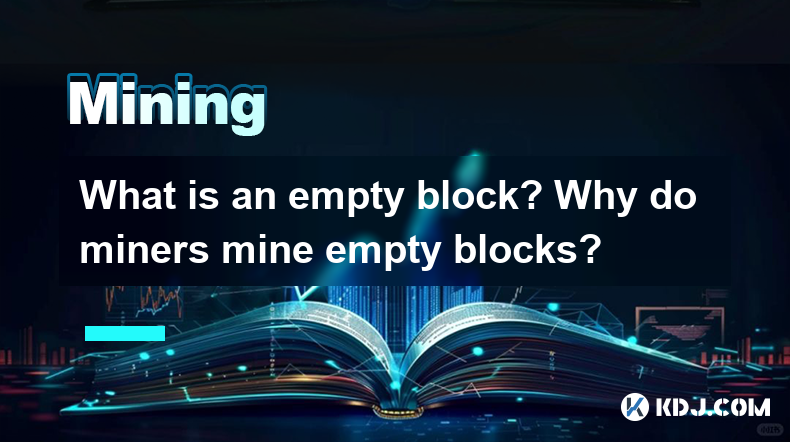
What is an empty block? Why do miners mine empty blocks?
Apr 16,2025 at 01:28am
What is an Empty Block?An empty block in the context of blockchain technology, particularly in cryptocurrencies like Bitcoin, refers to a block that contains no transactions other than the coinbase transaction. The coinbase transaction is a special transaction in which new bitcoins are generated and awarded to the miner who successfully mines the block....

How to reduce the electricity cost of mining?
Apr 16,2025 at 08:42am
Mining cryptocurrencies, particularly Bitcoin, is an energy-intensive process that can lead to significant electricity costs. However, there are several strategies that miners can employ to reduce these expenses and make their operations more cost-effective. In this article, we will explore various methods to minimize the electricity cost of mining. Cho...

What is the difference between cloud mining and physical mining?
Apr 16,2025 at 01:49am
What is the difference between cloud mining and physical mining? In the world of cryptocurrencies, mining is the process by which new coins are generated and transactions are verified and added to the blockchain. There are two primary methods of mining: cloud mining and physical mining. Understanding the differences between these two approaches can help...

What does mining difficulty adjustment mean?
Apr 16,2025 at 12:42am
What does mining difficulty adjustment mean? Mining difficulty adjustment is a crucial mechanism in blockchain networks, particularly in Proof of Work (PoW) systems like Bitcoin. It ensures that the rate at which new blocks are added to the blockchain remains consistent, despite fluctuations in the total computational power (hash rate) of the network. T...

What hardware configurations are required for GPU mining?
Apr 16,2025 at 09:21am
GPU mining has become a popular method for cryptocurrency enthusiasts to mine various cryptocurrencies, such as Ethereum, Ravencoin, and others. To successfully engage in GPU mining, it is essential to understand the hardware configurations required to maximize efficiency and profitability. This article will delve into the specifics of what you need to ...

How do decentralized mining pools work?
Apr 16,2025 at 05:42am
Decentralized mining pools represent a significant evolution in the world of cryptocurrency mining, offering a more democratic and transparent approach compared to traditional centralized pools. In this article, we will explore the mechanics of decentralized mining pools, their benefits, and how they operate within the cryptocurrency ecosystem. What are...

What is an empty block? Why do miners mine empty blocks?
Apr 16,2025 at 01:28am
What is an Empty Block?An empty block in the context of blockchain technology, particularly in cryptocurrencies like Bitcoin, refers to a block that contains no transactions other than the coinbase transaction. The coinbase transaction is a special transaction in which new bitcoins are generated and awarded to the miner who successfully mines the block....
See all articles























































































